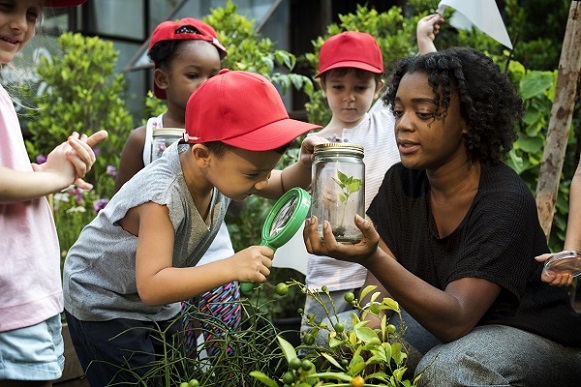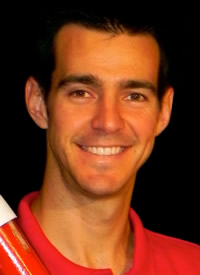Next Gen Navigator
Refashioning Informal Education to Support 3-D Learning
Posted on 2019-10-17
Disclaimer: The views expressed in this blog post are those of the author(s) and do not necessarily reflect the official position of the National Science Teaching Association (NSTA).

Supporting NSTA’s recent name change to National Science Teaching Association, the 2010 National Research Council book Surrounded by Science: Learning Science in Informal Environments states, “A great deal of science learning, often unacknowledged, takes place outside school in museums, libraries, nature centers, afterschool programs, amateur science clubs, and even during conversations at the dinner table.” Like many parents, I have seen the wonder in my childrens’ eyes as they stare at the skeleton of a gigantic dinosaur, and have gazed intently (for what feels like ages) at an “investigation station” as my children explore the artifacts before them. Museums, science centers, and other informal education venues offer something I cannot provide on my own, and have my family coming back to over and over.
As a science educator, I am likewise familiar with the Framework’s vision for K–12 science education, a vision that emphasizes the need for our classrooms to “capture students’ sense of wonder about the world and to spark their desire to continue learning about science throughout their lives.” It is in this spirit that informal science education institutions support science educators twofold. On one hand, such institutions offer access to otherwise out-of-reach artifacts, collections, datasets, and larger-than-life demonstrations that students engage with through a variety of programming. On the other hand, informal education centers have long acted as hubs for teacher and leader professional development, supporting teachers charged with crafting the “rich science experiences” envisioned by the Framework with a deference toward experiences that are locally and culturally relevant, serving their diverse community of learners.
In this month’s Next Gen Navigator, we hear from four informal science educators who have responded to the Framework’s vision and guidance and are leading changes in classrooms and informal science education experiences alike. On the preK–5 stage, we’ll hear from Corrine Steever of the New England Aquarium’s Teacher Resource Center about how its staff have restructured professional development to delve deeper into the standards and the three-dimensional elements that comprise them.
For a grades 6–8 perspective, we have a double feature this month. We’ll hear from Angela Damery, director of education for the Wade Institute for Science Education, about how its staff leverage their reach to more than 40 informal learning institutions annually to create regional-based, locally relevant, three-dimensional professional development. In addition, Irene Porro, PhD, director of the Christa Corrigan McAuliffe Center for Integrated Science Learning, will discuss the center’s partnership with NASA to bring DIY Universe to “outside-of-school-time” (OST) organizations, regardless of the facilitators’ background in Earth and space science.
Our final perspective comes from Vanessa Lujan, PhD, from the Lawrence Hall of Science, University of California, Berkeley, and director of BaySci, a California-based collaborative of organizations, districts, and schools aimed at improving access to equitable science and environmental learning opportunities that is systematically enhancing the quantity and quality of K–12 science teaching and learning.

Sean Mussleman
Next Gen Navigator Guest Editor
Sean Musselman is a K–8 science specialist for the Burlington, Massachusetts, Public Schools and a former eighth-grade Earth and space science teacher. He is the author of the NSTA Kids e-Book, Thinking Like a Scientist: Investigating Weather and Climate , and serves as local chairperson for the NSTA 2020 National Conference in Boston. He also is the coordinator of Burlington’s K–8 FIRST LEGO Robotics programs and volunteers for the Massachusetts Association of Science Teachers. Find him on Twitter: @MrMusselman.
Helping Educators Develop Young Ocean Problem-Solvers
Teacher Services Supervisor Corrine Steever shares how the staff at the New England Aquarium’s Teacher Resource Center link real-world phenomena found at the aquarium with NGSS-supported lessons for the classroom. Read more.
Partnering for Maximum Impact
At the Wade Institute for Science Education, staff work with a variety of informal learning partners to create rich, three-dimensional professional learning experiences for teachers. Director of Education Angela Damery discusses how this unique collaborative approach enables them to provide professional learning programs that equip teachers with the resources, knowledge, and skills they need to begin creating a culture of authentic and relevant investigation in their classrooms. Read more.
DIY Universe: Empowering OST Organizations and All Educators to Use NASA’s Universe of Learning Resources
Irene Porro, PhD, discusses DIY Universe, a new way of engaging with research findings and data from NASA’s Great Observatories and other major NASA astrophysics missions, developed by the Christa McAuliffe Center for Integrated Science Learning at Framingham State University. Read more.
It Takes More Than Teacher Professional Development: Building Systems-Level Capacity for NGSS Implementations
Staff at the California-based collaborative BaySci assist districts in building system-wide capacity for supporting high-quality, equitable science education through well-designed professional learning experiences for district leaders and teachers. BaySci Director Vanessa Lujan, PhD, discusses her belief that when informal science institutions develop genuine partnerships with educators, schools, and districts, science education expertise, leadership, and capacity is increased. Read more.
Note: The Next Gen Navigator is a monthly e-newsletter from NSTA delivering information, insights, resources, and professional learning opportunities for science educators by science educators on the Next Generation Science Standards and three-dimensional instruction. Click here to sign up to receive the Navigator every month.
The mission of NSTA is to promote excellence and innovation in science teaching and learning for all.
NGSS Professional Learning old Three-Dimensional Learning


